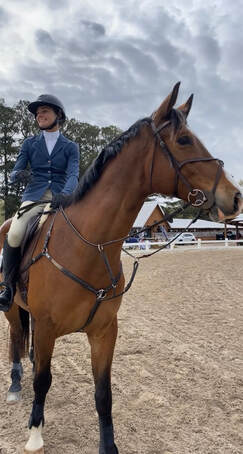 While many of us buy a horse thinking it’s going to be a lifetime friend, the reality is that horses can live 30 years or more and are extremely time consuming and expensive to keep. It may not be feasible to keep a horse forever. The following article details some factors to consider when looking to sell a horse for most english disciplines. If you have a horse to sell, you have some options: 1) List the horse yourself, 2) Enlist the help of your regular trainer, 3) Send the horse to another professional who specializes in selling horses that are similar to yours 4) Sell the horse at a public auction or sale. In this article, I’m going to talk mostly about the first two options and some of the reasons it might be good to consider #3. In my business, I typically see the following reasons behind a horse sale:
Pricing Pricing horses in today's market is tough! For green horses with little show experience, breeding and quality of movement have the greatest impact on pricing. For going horses with experience, show results have the greatest impact on price. If you’re looking to price your horse, start with a basic internet search of what horses of a similar age and show experience/results are selling for. Green OTTBs are generally going to fall into a pretty narrow price range, with the higher end being those who have excellent movement or jump and the lower end those who are older with previous injuries, a lot of nervousness/tension, and other difficulties that may make them hard to handle by an average amateur. If your horse has no show record, can’t be bred, and isn’t the ideal candidate for absolute beginners, you’re going to have a hard time selling him in any market. Location is a big factor in horse sales. I prefer to sell horses in Aiken or Ocala at the beginning of the season because there’s a lot of buyers looking in that area, and the horse will sell quickly for a better price. The climate and access to facilities such as a XC course can also help me show off a horse to the best of its ability. I will say, there’s a growing market in NWA for rideable horses under $15K with potential for hunters/jumpers/dressage! If you’re listing a horse somewhere without an active riding community in the discipline your horse is best suited for, be prepared for it to take a lot longer, and accept a lower price, than if you take the horse to a better location. If I have a horse with a particular skill set, special considerations, or I need to sell a horse at certain time of year, I will often use a sales agent or trainer in a "hotter" horse market. I am not going to have an easy time selling a preliminary level eventer in Arkansas in July – no one wants to come here to try that horse! Most professionals charge a 10%-15% commission on the sale price of any horse they are representing. That commission covers the time that goes into making videos/advertisements, time spent finding and talking to potential buyers about the horse, the potential liability involved in having someone come to try the horse, and the time involved in the vetting/contract process. If I’m selling the horse myself and I have an accurate assessment, I’m probably going to network that horse by sending a video and basic description to other trainers I know. If that doesn’t hit, it’s time to make a good sales ad. Sales Ads Absolutely do not post a horse advertisement or talk to anyone about the horse you have for sale unless you can inform them of:
Have decent photos and/or video ready to go. If you’re selling the horse as a jumper, you have to have good over fences video. For any discipline, it’s good to have high quality images of both sides of the horse to evaluate conformation. While Facebook still seems to get a lot of activity for horse sales, keep in mind that livestock ads are illegal and you need to be careful about getting your post flagged for removal. Many people will use terms such as “Low 5 figures” or X # of carrots, to help with this. There are some other great horse sale sites such as dreamhorse.com, manestreetmarket, warmblood horse sales, sporthorse nation, etc. Do some searching around and don’t be afraid to post ads in a few different places. If I’m selling a horse from my farm, I’m going to make sure I put up its information on my website and use a variety of photos / videos on different social media channels. Once you have advertisements up, it’s important to respond to inquiries in a timely manner. If someone under the age of 18 contacts you about your horse, request that they have an adult or trainer copied on the conversation. There's no benefit to discussing details about the horse with someone under the age of 18 because they likely are not making any real sales decisions and can't conduct a legal transaction. Don't be afraid to ask questions of the buyer. Start with, “Can you tell me more about what you are looking for?” If the person can’t answer that question, they are a tire kicker. If they are looking for something that your horse is not, tell them so! Don’t waste your or the other person’s time if it’s clear it won’t be a good fit. You don’t want to sell your horse to someone they aren’t suited to, it only opens the door for bigger problems later. So you have a potential buyer... If you find a qualified adult and have shared photos/videos, answered all the basic questions, and had an honest discussion about the buyer’s riding ability and desire to purchase your horse, it’s time to set up a time for them to come meet the horse in person. A few notes on trials, while a lot of buyers will request this, I generally avoid off-site trials unless I know the person or they are very local. No matter what is signed, there’s a lot that can go wrong in an off-site trial! If you have a potential buyer coming to meet your horse, make sure the horse is well prepared. That means they have been worked regularly, are clean, trimmed up, and have clean, well-fitting, tack ready to go. It is a good idea to also let the potential buyer see how the horse is to catch, groom, and otherwise handle on the ground. This also lets you as a seller get an idea of the potential buyer's comfort level. If possible, I always recommend the seller or seller's trainer ride the horse for a few minutes in front of the buyer, explaining how the horse is usually warmed up, any preferences or quirks the horse has, and what a typical riding session might be like. From there the buyer or buyer’s trainer can get on. If an amateur rider comes without their trainer, I’m going to encourage them to get comfortable, but also set clear guidelines about what they can or can’t do with the horse on my property. If I have a green OTTB who has jumped some X-rails, I’m NOT going to let a potential buyer take that horse over a 3’ XC jump. I know this sounds obvious, but you’d be surprised how many buyers have very different standards or expectations. Do not be afraid to say, “I don’t think this is a good fit!” or “I’m not comfortable with you doing that.” Other things to discuss with a potential buyer include what their boarding, vet, and farrier situation is like, how often they ride or take lessons, and other environmental factors that may affect how your horse performs in the future once sold. While not every sale works out, as a professional, I don’t want to sell a horse into a new situation where I KNOW it will fail – that’s going to reflect poorly on me and hurt my business in the future. Vetting If the buyer likes the horse, it’s probably time for them to arrange a pre-purchase exam. Ideally the potential buyer picks the vet, but in more remote areas (like here), I sometimes have to give them a list of options. I’m upfront if there’s a vet that has regularly treated the horse, because the buyer may not want use that one. I am also candid about vets in the area who I don’t think will be a good choice because of their unfamiliarity with performance horses. Ideally everything goes well or any potential issues have been discussed so the buyer isn't caught off guard. If the horse “fails” the vetting, it doesn’t mean the horse is unsellable, but it's likely that adjustments on price and description/potential future use will be necessary. I recommend offering to purchase any X rays or reports that indicate new, previously unknown issues, so you can keep them for your records. No matter what, you're going to have to disclose whatever was found to any potential future buyers! If the vetting goes well, it’s time to draw up a contract! Sales contracts should include the basic horse information as well as any identifying registration numbers (USEF, USEA, Breed, microchip, etc.). Check with your local/state requirements as some states have particular items that must be included or disclosed on any equine bill of sale. Not every seller is able to offer this, but I usually include a “first right of refusal” clause – or at least require notification if the horse is sold again. This is how I try to make sure that a horse I sell doesn’t end up in a bad situation. All horses I personally own and sell come with the guarantee that they can come back here (for free) if the owner ever ends up in a situation where they are unable to properly care for the horse. Contract accepted! I always send horses with some quantity of their current feed and a halter/lead rope, as well as a typed sheet of basic information such as feed, tack, vaccination dates, farrier dates, etc. Make sure this is given to a new barn manager or anyone else who might be responsible for the horse’s care throughout transport or in the future. Hopefully with all this in mind the horse has gone on to an excellent new home and will be a great partner for its new owner! If you make a good match, there's nothing better than seeing that horse succeed with someone else!
5 Comments
12/4/2023 02:56:15 pm
Thanks for sharing such a great information.. It really helpful to me..I always search to read the quality content and finally i found this in you post. keep it up!
Reply
12/4/2023 02:59:17 pm
Amazing post, thanks for sharing this article. I am truly motivated by you for blogging.
Reply
12/4/2023 03:00:43 pm
Wow this blog is awesome. Wish to see this much more like this. Thanks for sharing your information!
Reply
Matthew
1/22/2024 08:55:11 am
Sassy is not broke she needs trained and she's 10
Reply
Leave a Reply. |
Details
Christy ZweigAdventures eventing as a semi-pro in the mid-south. Archives
April 2024
Categories |
Proudly powered by Weebly

 RSS Feed
RSS Feed